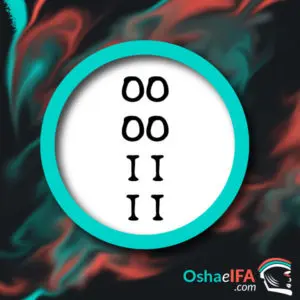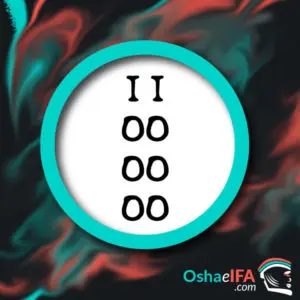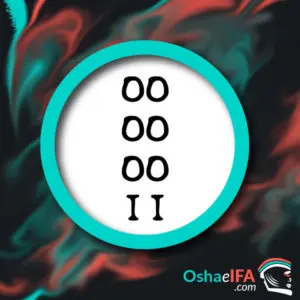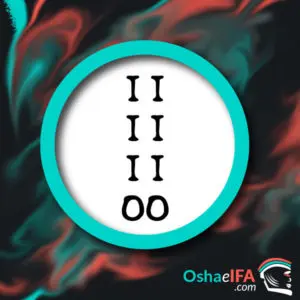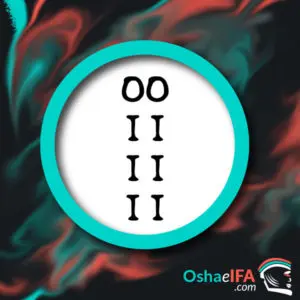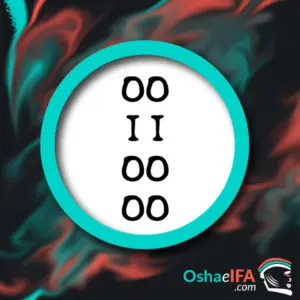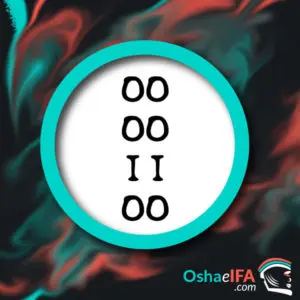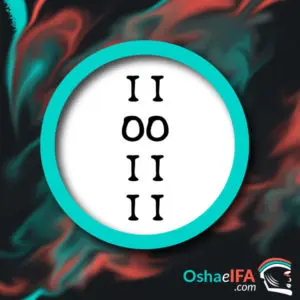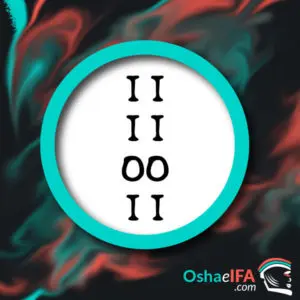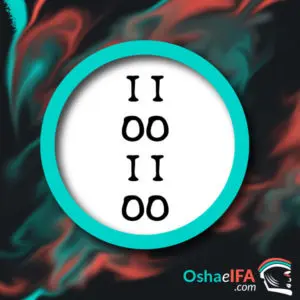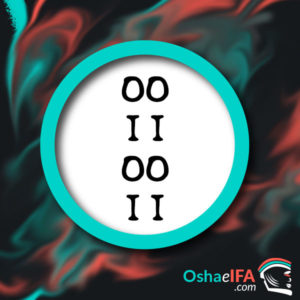Baba Ejiogbe or Eyiogbe: Meaning, Tips, Sayings, Pataki and More
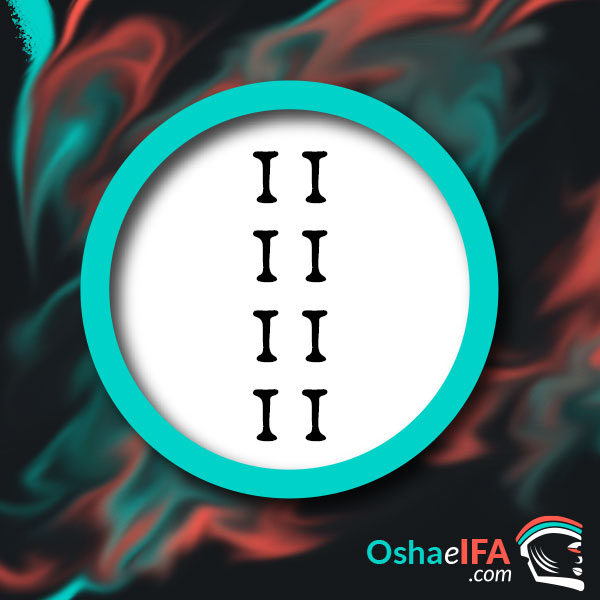
Baba Ejiogbe It is the number one Odu in the genealogical order of Ifá. It is the most important of the Odu of Ifá, it symbolizes the principle of all things and is recognized as the father of the other signs, in addition, it occupies the first place and is the fixed sign of Orúnmila and Ifa.
Treatise of the Odu of Ifa Baba Ejiogbe
Meta y Reflection of Ejiogbe:
It is important for the people governed by this Odu, to control the character and the way in which they interact with others, like the Irunmole “Ejiogbe”, they will have adversities, conflicts and enmities that will try to obstruct the way, but we must avoid that the actions of the opposites affect our daily life.
It also invites us to be more tolerant with the opinions of other people since this Odu enters a state of frustration and helplessness when others do not share our point of view, generating discussions and discomfort in our relationships. All this produces instability and inconsistency in our environment, material and spiritual disturbance.
Ifa says in Ejiogbe that a disturbed head has a harder time channeling its objective.
This is an Odu of impatience, where you want things to materialize immediately, regardless of the processes that we must go through in order to obtain any benefit. Ejiogbe reveals the process of the creation of the world, including all the difficulties that the divinities had to be able to fulfill the designs of Olodumare, this leaves us the teaching that if we persevere and do not lose our calm we will be able to fulfill our objectives.
This sign shows us that the astral of a person can change from one moment to another, it can be in Ire and in an instant be in Osobo (Ayewo), this change may be due to lack of promoting the appropriate sacrifice, breaking some taboo have some kind of inappropriate behavior.
Ifa says in Baba Ejiogbe:
Ifa predicts change and general renewal in the work and business environment, this is a sign of position and hierarchy for people who use an appropriate code of conduct, sarcasm, arrogance and especially discrimination against less fortunate people must be avoided, in this way the Ire that the deities send into our lives will be obtained.
Orunmila says that success is neither expected nor required, success must be forged daily, this Odu invites us to be vigorous and organized in the activities that concern us, as well as analyze and ask Ifa whenever a decision needs to be made. important.
Ifa says that we must adhere to the Orisha Obatala, which through an older person will test our ability to help others and thus send us an Ire that is reflected as an opportunity to ascend in position or Hierarchy. In this Odu Orunmila demands respect for the elders, family members and religious.
In aspects of Health, this sign speaks of constant headache generated by stress, you should avoid lifting very heavy objects and making sudden movements since people with this Odu tend to suffer from the spinal column.
It is taboo in Ejiogbe to induce abortion, as there will be physical and spiritual disturbances generated by the Abikus.
In the sign Baba Ejiogbe is born:
- Place coconut on the left foot of the person to whom an Ita is performed.
- The Itá del Santo.
- The government coup.
- That the casserole of omiero the consecration of Santo, does not carry coal.
- The babalawo of this Sign of Ifá cannot kill animals for pleasure without first consulting Ifa.
- I prayed.
- The manifestation of the day, as the forces of Olorun.
- Mourning.
- The ladder of Ifá.
- The rebirth to material life for well-defined reasons.
- The dispersion of languages.
- That Olofin leave the Ifá room after his meal on the 6th day
- To the gba fo guede.
- The rivers.
- That only black chickens are sacrificed to Orúnmila by Olofin's sentence and the passing of his hand with corojo butter and chicken fat so that he does not get cold.
- Blood vessels and lymph.
- Why water is given to the Saints when they come, because they come thirsty (Olofin road and the children).
- Washing the legs of feathered animals that are sacrificed to the Saints and Orishas.
- The great virtue of the sacred word of the Coconut (Obi).
- The breathing.
- The principle that without oxygen there is no life.
- The exchange of energy and fluids between organic beings and their environment.
- Doing Ashinima to scare away Death (Iku).
- Here: This Odu's Awó and Ogbe Roso are never together.
- There is a problem with the mitral valve.
- You have to have humility and patience.
- Speaks the spine and sternum, support of the rib cage.
- The will speaks, of losses and of tears.
- He speaks of three brothers, one son of Orúnmila, another of Obatalá and the other of Yemajá.
- Talk about masks and blinds.
- Talk about the sea level and its dire consequences.
- The hunter who had a bad situation and Ifá advised him to make Ebo with holster and arrows.
- The Butterfly whose wings were burned for wanting to fly before its time.
Recommendations of the Baba Ejiogbe sign
- Health must be taken care of.
- A bottle of brandy mixed with Ayúa bark is prepared after several days and is good for asthma.
- Ayúa bark is chewed for toothaches, and as common water to purify the blood it cures syphilis and rheumatism.
- Take Bejuco Ubí juice to disinfect the bladder, be careful because it is abortifacient.
- Take sumo de güira as an expectorant and for pneumonia.
- Infusions of Orozuz of the earth for the stomach and asthma.
- Atiponlá herb leaves in decoctions for the urinary tract.
- Loa green Cotton buds, squeezed slowly in warm water and in drops for earaches. The cooking of the seeds for bronchitis and asthma.
- Ejiogbe is the Odu of Ifá that accompanied Ifá orunmila and to Olofin Akoko (Oduduwa), and who constitutes the Odu Isalayé of both.
Sayings of Baba Ejiogbe:
- Not so poor that his anus can be seen.
- The head rules the neck.
- Happiness in the poor man's house does not last long.
- There is no evil that lasts a hundred years, a doctor who assists it, nor a body that resists it.
- This river and the other river have only one King, the sea.
- The hands reach higher than the head.
- He was born to rule.
- There is no variety of fabrics that is unique among fabrics.
- Similar characters, they forge a friendship.
- To be able to find an elephant you have to go to the forest, to find a buffalo you have to go to the meadow, but a bird of airón can only be found after a long time.
- Rain forms black clouds in Heaven for the good of the deaf and makes noise for the good of the blind.
- The eyes will be red but not blind, the banana looks ripe but is not soft, the problem causing anxiety is
- will solve, will not kill anyone.
- The rich man eats without complaint, the poor man eats voraciously, the poor man who associates with a rich man becomes impertinent.
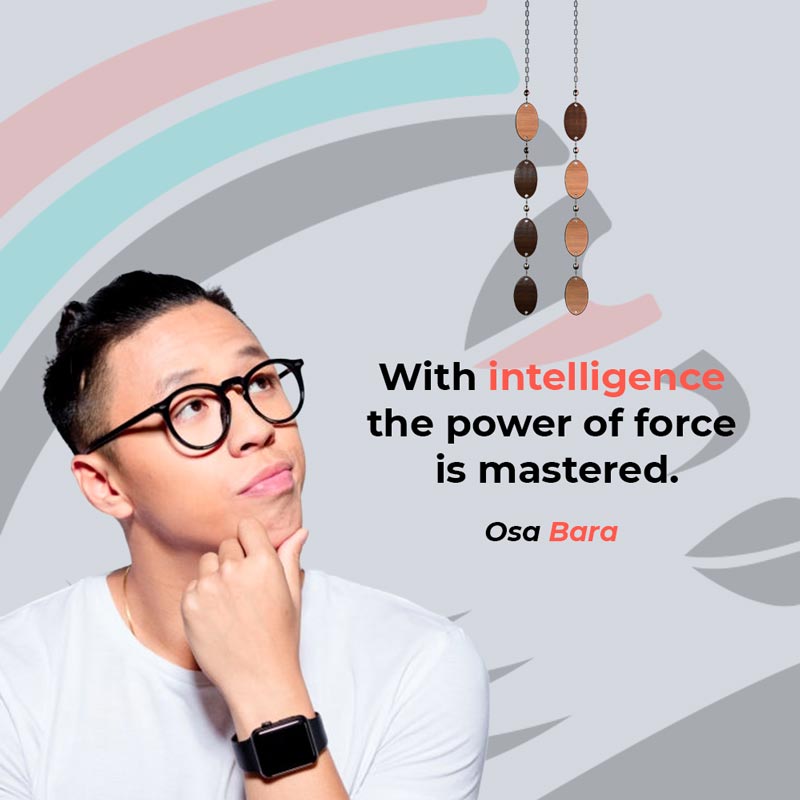
Other sayings of the Baba Eyiogbe sign
- When the head is on the shoulders, the thought on the horizon and the feet in the salty water, we have no doubt that we are facing the sea.
- When a child with a big head and a small body is born, it is to be assumed that when he grows up he will live on it.
- Pigeon that is born with its white plumage, its color never changes.
- The path is free for the dog.
- The pig can spend its life on the stone, but prefers to live under it.
- There is an evil that touches Heaven and Earth.
- Neither width nor length can the hand be larger than the head.
- Chinese stone never softens.
- A single king rules his people.
- Two inseparable friends separate.
- He who hides his evils will be buried with them.
- Dead king, put king.
- No head cloth can be wider than that worn by the Ancients of the Night.
- I have everything and I lack everything.
- Whenever music is heard, the sound of the bell will be louder than that of the other instruments.
- The sea made a sacrifice and returned to its hole.
- No hat can be more famous than a crown.
- Olodumare gives a beard to those who do not have a jawbone.
- The palm tree has more influence than the other trees.
- Nobody eats the turtle with the shell.
- Protector of the city is the name of Eshu.
- The head rules the body.
- Debts hang around our neck.
- No costume is longer than that worn by Witches.
- The shell of the slug is preserved after eating the meat.
- There is no evil that lasts a hundred years, a doctor that assists it, nor a body that resists it.
- This river and the other river have only one king, the sea.
- Happiness in the poor man's house does not last long.
Baba Ejiogbe Quotes
- All the honors of the waters that are on earth are less than the honor of the sea.
- The hand raises higher than the head just to protect it.
- On the roads and highways there is no distinction, the good walks the same as the bad.
- Wisdom, understanding, and thought are the forces that move the Earth.
- No king is as great as Orúnmila himself.
- No forest is so thick that the Iroko tree cannot be seen.
- The crown of the rooster is its crest.
- The doctor can heal another, but not himself.
- Whoever performs numerous mysterious acts during childhood is considered a prodigious child.
- Sometimes death is the result of ignoring the advice of the elders.
- A long discussion takes one as far as Ifá.
- I will survive the cold hands of death.
- The hoe carries gifts from inside and outside the house into the home.
- It is a mistake not to learn from mistakes.
- The squirrel's mouth is what causes the Boa to lose its life.
- The contradictions bring to light from their hiding place.
- Only Orúnmila is capable of changing destinations.

Ifa Code of Ethics of the odu Baba Ejiogbe:
The Ifá ladder takes each Awó to the place that corresponds to him for his merits and attitudes.
Baba Ejiogbe sign prohibitions:
- When you see this Ifá you have to spend seven days without going out on the street.
- You can't wear striped clothes because you are attracted to prison.
- Don't get involved in anything you don't care about.
- Do not receive or carry errands at night.
- Do not enter any house without permission so that you do not have a hot flash.
- Do not allow children in your home to crawl on the floor.
- You can not play interest so you do not lose.
- You cannot play or be a player because you will go to destruction and ruin.
- You cannot have three women at the same time 1,2 or 4
- Ejiogbe's spouse must be of a different color from his white or black, never mulatto.
- Never walk around with witchcraft things.
- No sweet potato, eggs, or sandy fruits are eaten.
You can read: Ifá signs and their meaning.
Description of the odu of Ifa Baba Ejiogbe:
In Ejiogbe the two faces are identical, Ogbe is on both sides, that is why it is called Ogbe Meji, but it is universally recognized by Ejiogbe. It is called the Odu of double language because both good and bad speak in it. There is a balance of forces that always bodes well.
This Odu represents the Sun (Light), it is the beginning and the end of all universal processes and events, for this reason it is called (Ye Yesán).
He is the direct son of Metalofin and Aiyé. He is the Messiah of Ifá and the Prince of the Odus, because he contains the secrets of creation and the positive and the negative, He is * Yin and Yang. It is related to the waters, the palms, the kola nut, the spinach, the spinal column, the sternum, the blood vessels, and the * lymph. In this Odu, respiration is born, the principle that determines that without oxygen there is no life, and the exchange of energies and fluids between organic beings and their environment.
This Odu Baba Eyiogbe rules the earth and ensures a good omen during the day, while Olorun is shining. He is in charge of maintaining the life of everything and its perfect balance while there is light, he is the king of procreation, since light is the main source for this principle. In this Odu "Baba Ejiogbe" all natural laws and processes are governed, on a cosmic scale, while there is a perceptible ray of sunlight. It is related to the rains, the rivers, the seas, the lagoons and all the accumulations of fresh and salt water.
Meaning of Oddun Baba Ejiogbe

It is also identified with birds of prey, scavengers and the decomposition of corpses. It speaks of the will, as a powerful weapon. Man divides the earth into continents, states, provinces and towns and appropriates it even though it does not belong to him. The cardinal point of this Oddun Baba Ejiogbe is the Orient (East), where the flesh merges with the spirit.
Baba Ejiogbe is closely related to Obatalá because it means the head and it was where the Orí was established in the body of everything, also because it means the greatness and extension of Heaven; with Yemajá by the immensity of the sea; with Orúnmila for the rich cosmogony that it contains. It is a Sign of infinite greatness because in it everything that man cannot be born
do for yourself.
It is the Oddun (Baba Ejiogbe) of the star that represents the Almighty, Olorun (the Sun), the one that transmits the heat to us with its wonderful light, the celestial vault and the bodies that are in it, without which it would not be possible to lifetime. That is why its associated color is white and orange. It is related to all the Orishas, although in this Oddun Olokun is born, which is the darkness that reigns in the depths of the sea. It is a point of reference for the dichotomy between good and evil, two very marked and opposite tendencies, which one without the other would not exist. Good did not fuse evil and vice versa, but the reason for one is the other. In it all the Orishas speak, and it was the separation of Earth and Heaven. Here the vulture descends on the corpses to eat them.
He became the father of the other Odus and teacher of the day. The night (Babá Oyeku Meji) opposes him as the negative force because of its darkness and gloom, since everything that is not clear is opposite and harmful to him. In him the Ifá ladder was born, in which each one in this World, corresponds to a specific place. It is the rebirth of material life for well-defined reasons.
This Odu speaks of light and general good well-being, victory over enemies, spiritual awakenings, and peace of mind. New and great deals, relationships can be expected. There is a possibility of confrontation, which requires common sense to succeed.
Baba Eyiogbe speaks:
The spirit that works with Eyiogbe (the Egun) is called Obá Igbolá, and it is the one that must be invoked when help from this sign is needed. Here the path of Eshu-Elegba that the person has to receive from the hands of the Awó, is Eshu-Elegba Alampe. On this road to Orúnmila he is known as Abambonwo and it is by that name that he must be called when working with him.
This sign speaks that for prosperity and the overcoming of difficulties, lilies are dedicated to Olorun in a vase on the table and every day the person smells them and asks him, what he wants, to overcome his difficulties. Talk about unhappy person in love. Discord, misunderstandings, family arguments, you have to be careful of laughter does not drown you. Separation of family, race, peoples, black and white. If he comes in a fortune-telling I will go, there will be children and money even in the last days of his life.
For this Odu Baba Ejiogbe you have to be calm, because you will find someone who will help you out of your problem and will almost certainly be a gray-haired old person and from there a beautiful friendship and esteem will come from both parties. Character must be tempered and care must be taken against partner abandonment
In all the circumstances, he must attend to his Guardian Angel, and pray a lot to Yemajá that in this Odu he gives luck and prosperity.
Advice from Oddun Baba Ejiogbe
For this Oddun speaks of the possibility of wealth and development, provided the necessary sacrifices are made.
Ejiogbe predicts long life, provided that the person takes care of their health, to achieve this Goal. People incarnated with this Odu should consult the Oracle of Ifá before making any important decision in life.
This Odu (Eyiogbe) speaks of shadows moving in the house. Three brothers and a family who lie down and are always asking for things. There is malicious abuse of trust. Good feelings are exploited. Here luck is round. When this Odu speaks badly (osobo), he speaks of the loss of a loved one, who is an elderly person. Everything is loose, except the head, if it is in an Ikofafun or Awafakan plant and that Osobo is Iku, Ashinimá must be done, to scare away death. There may be doom through bad company, drugs, or alcoholism. Discord between friends or family.
Due to this first work of Ejiogbe on Earth, when he leaves during the initiation ceremony in the Igbodun, all the sacrificial materials are required to be double: 2 goats, 2 goats, 4 chickens, 2 snails, 2 fish, 2 rats, etc.
When Ejiogbe goes out in the Igbodun, salt and palm wine are always added to the initiation materials, in commemoration of the events that occurred on the day of his birth.
Predictions of the sign of Ifa Baba Ejiogbe
When this Odu appears in Okpele or Ikin divination in ordinary divination or daily consultation, the diviner should be advised that:
For a person with a pending judgment, you should offer two chickens, hand-spun string, and plenty of ginger. The Ifá priest prepares the feathers of the chickens and the ginger seeds by threading them on the string to form a necklace, which he will wear until the day of judgment, after which he will remove it with the rod of authority in front of Eshu Elegua.
When this Sign of Ifa appears for a woman who wishes to have children, she will offer a guinea and a goat to Eshu-Elegba and deposit the sacrifice in a running drain. Without fail he will have many children.
To avoid comments, four doves and four bags of salt should be offered to Ifá. If a married woman comes, she must prepare a feast in multiples of five (five plates of soup, five plates of mashed yams, five plates of meat, wine, kola seed and water), in addition, she will wash clothes, sweep and he will clean the house and shake the dust from the husband's Ifá tureen, to avoid the offense of the destructive divinities that accompany him. This way, they won't destroy her.
When Baba Ejiogbe comes osobo Ikú, to avoid death he will offer a goat to Eshu Elegua and a bronze bell washed with the appropriate leaves so that he can ring his Ifá every morning.
Baba Ejiogbe in love
For a woman who intends to abandon her husband, she is warned not to do so because it will bring her death, especially if she is the wife of an Ifa Priest. In the case of a man, he is told during the consultation to offer a goat to the head of his wife. He must also tell him that his oldest wife, if she is of the yellow race, is a benevolent witch who will help him prosper as long as he does not look down on her. If, on the other hand, a man's oldest wife has deserted him, he is told to go and beg without delay to return to him, or else he will return to hardship.
Children of the Odu Baba Ejiogbe
The children of this oddun live looking for peace and prosperity, or they also want to have children or have a new project, where they will be told that Ifá says, that if the person makes an offer or Ebó, all wishes will be achieved and it will be successful. .
Baba Ejiogbe in Ire
The person with this Odu, the enemies cannot destroy it with their own strength, for this they need something that is beyond their possibilities. Baba Ejiogbe's children by Ire are indestructible by their fellow men, only the Orishas can harm them. Ejiogbe has the power of Olorun and all the Orishas, there is no human force capable of defeating him.
The luck of this person has been and will be great, but his enemies have their eyes on him, they envy him what he does and has. Currently the person does not know what to do to solve their problems. The head walks on the ground and this is what guides the body.
Prayer of the Odu Baba Ejiogbe:
BABA EJIOGBE ALALEKUN MONI LEKUN OKO AYA LOLA OMODU ABOSHUN OMO ENI KOSHE ILEKE RISHI KAMU ILEKE OMO LORI ADIFAFUN ALADESHE IMAPAPAPORO TIMBA BELEDI AGOGO.
Suyere of the Oddun Baba Ejiogbe:
ASHINIMA ASHINIMA, IKU FORI BOYEMA
ASHINIMA ASHINIMA, ARUN FORI BOYEMA
ASHINUMA ASHINIMA, OFO FORI BOYEMA
Baba Eyiogbe's Ebbo:
Ejiogbe's work to move up in government or work
A cotton tower is made, inside the generals of those who have to do with the matter of promotion are put, honey and husk are added, two candles are smeared in honey and white sugar and they are lit to Obatalá next to the tower from Thursday to Thursday. Before going to that place, 8 Ebó Misi will be given with herbs: Sleeper and 8 with White Bell and every time you go to that place, the grass powder will be smeared on your face: Sleeper, ashes of white doves feathers, each time that a candle is finished, they are renewed on Thursdays.
When the promotion is achieved, it will be fulfilled with Obatalá. Obatalá is lit a lamp for the house on a white plate with a pigeon egg, almond oil, cocoa butter, name and surname.
For this Ifá, the Awó must always have a kpuele in his pocket.
Work for Ejiogbe Ifa
In a small wooden box, put a small jar with water and sand from the river and another with water and sand from the sea, apart from it, you put shell, hutía and smoked fish, cocoa butter, toasted corn, to this five pigeons are sacrificed white and the heads are thrown into the box, and two coconuts painted with husk are placed on the lid and the box is placed under the bed of the person concerned; At the end of the year after the work was done, the coconuts are scraped in the street, the pots are filled with their corresponding waters, the inside is given again 5 white doves and it is resealed after pouring the corresponding works. heads, the box is closed and two new white painted coconuts are placed on it and placed again under the bed at the head of the person concerned.
Herbs (Ewe) of the Odu Baba Ejiogbe 8-8:
Red mangrove, Palo Bobo, Mano pilón, Itamorreal, Ceiba, Orchid.
Ayúa, Bejuco Bí, Güiro, Cundeamor, Coralillo, Orozuz.
Iroko, Rosa cimarrona, Jobo, Romerillo, Almácigo, Granada.
Cotton, Prodigious, Rose Pinion, Atiponlá, Bledo Blanco, Almond, Canutillo.
Patakie of the Baba Ejiogbe sign:
Beginning and end of all things.
Baba Ejiogbe's Story:
There was a time when saints, people and animals hated each other, threw each other among relatives, mothers and children, there was still no directional belief and saints threw each other.
There were religions such as Abakúa and Mayombe, but there was no head or prophet to rule and in the face of this situation Olodumare was given an account. Responsible for governing, among them was Olofin, a saint of respect, for which Olodumare gathered them all and asked them: -what do they bring or have to govern. Among all the answers
Olofin only said: I bring heads and before this answer Olodumare gave him the command of the entire world for his government.
Olofin tells Olodumare that to rule he had to give him command of the stars, mainly the sun, sea, air and earth and a trusted person who was on earth. (These places are the 16 Mejis that are the 16 lands that he founded and traveled and the compounds are the terms, of course each one has 16 different places), but in this journey of the last Olofin he realizes that a boy who was chasing him He transformed into different forms, before this Olofin calls him and asks him who he was, and he answers, I am Elegba. Olofin replied, you are not Eshu. And this tells him that what he was looking for was under the ground, and that he was in the first town he had passed, Olofin realizing that this was the most hated place where people walked without heads stumbling, that is to say that they were phenomena .
As in the last place where they were currently, it was precisely the place that announced that there were saints tied up or imprisoned or disobedience to the saint.
Olofin left with the boy who, just to go, was telling him lies along the way, but he told a truth that he had seen, the place that Olofin was looking for and as he found it, he gave him the authority and gave him the name to be together with him to solve the affairs of the world and he also told him that as long as the world was a world, he would be the guide of all the questions of the people and it is the beginning of all the future populations that will be founded. That is to say that Orunmila will be nobody without you, and you will be nobody without Orunmila.
Maferefun: Olofin, Eshu-Elegba, Egun and Orunmila.
When Inle upset her children.
Pataki of the Baba Ejiogbe sign.
When Inle met Olofin, he was upsetting his children in such a way that instead of giving them good advice, he gave them a bad example, but although it is not possible for them to find children without a mother, he would show that without a father there could be none either. Olofin withdrew the water from the sky for which reason the plants began to dry up, the earth cracked, animals and people died, then the children of Inle began to cry for the calamities that were happening and they presented themselves to Inle, and they made an agreement who would undertake to bring a message to Olofin.
The first one to make the commitment was Agayú the hawk, but as he passed from this planet to the other, the variations and the heat made him descend very dejected. Then the Eagle (Asha) promised to carry this message, but the same thing happened to him, saying that he was willing to die on earth than to climb up. Then the Tiñosa (alakaso) decided, and went up with the Ebó and overcame all difficulties, although on the trip she lost all the feathers of her head, but at last she was able to reach heaven, and found the door open, entered and found some deposits of water and thirsty he threw himself on his head to drink it. The father asked him what he was doing there and he replied that he brought a message from Inle and his children to Olofin. He was surprised and said to bring her to his presence and told him that Inle was asking for forgiveness for her and for her children that she was already convinced, then Olofin told Tiñosa you have come and for that reason they are forgiven, go away and after A few showers will fall from you and enough water for everyone, this is the reason that Alakaso has the power to announce when it is going to rain.
Before Tiñosa left, Olofin asked her why her head was without feathers and she told him that she had lost them on the trip due to difficulties, then Olofin blessed her saying that she would find the food before leaving her house, and that she would be respected by all the governments of the world.
That is why she finds her food before leaving.
Ejiogbe's embarrassment.
Pataki of the Oddun Baba Ejiogbe.
It happened once that Orúnmila was sick with the lungs and the hen took care of him, took care of him carefully, but Orúnmila stole his eggs every day and the moment came when the hen began to notice the lack of her postures and got into candle.
One morning when Orúnmila used to his daily robberies, it was for the eggs, and at the very moment when he committed such a misdeed he was surprised by the hen who told him: It seems incredible that you do that to me, I have taken care of you with such care and disinterest, but you steal from me, upon hearing this Orúnmila left the hen's house embarrassed.
Hence, Ejiogbe has to go through a great embarrassment.
The disembodied head, only Orúnmila saves him.
The head was disembodied in the square and had many coconuts in front of him, with which he traded. Shango arrived and her head told her that she could not take the coconuts and that to take them had to be with the condition, that she remedied her situation, because she could only speak and had to do everything else and she could not and that she was bored and tired of that situation.
Shango took the coconuts and did not help him, and the head sent him away. Then Orúnmila came to the square and saw the coconuts, and asked her head for them and she said: "I give them all to you in exchange for you to remedy my situation." Orúnmila accepted and said: -You have to pray with animals, food, 2 coconuts, and a lot of money. Your heads must be eating coconut for 16 days that this situation will last.
This was done by the head and when the indicated days passed, the chest began to emerge, then the arms, and other extremities, completing the entire body at the end of the 16 days. Then the head was very grateful to Orúnmila and said: -You are my father. He answers: -because he has come to the world to rule, but it was necessary for everything that happened to happen to him, for everything to be complete. From that moment Ejiogbe will rule the
world and everyone will have to go to his feet.
Baba Ejiogbe or Ogbe Meji Ifa Traditional Nigerian
Òtóótót
Òróóroró
Òtòòtò làá jèpá
Òtòòtò laa jèmumu
Lótò lótó ni wóón folú esunsuún senu
ohun tori ni tori
Ohun tòòrò ni tòòrì
Ohun torí toòrì làá rò fÓba Mòkín ní òde Ìrànjé
Kí Onírànjé or lè baà fòtòtò èèyàn tani lóre
Béèrún bá jà tú bá tà
Won a fówó lówóó
Won a fi gìyàn balè
A day fun Ògo tea
Èyí ti n gbóguún lo ilú gbèndù gbendu èyìn òwonràn
Wón ní kí Ògo tééré or rubo
Ògo tééré sì gbó ebo
Or ru
Ó gbó èerù
Or you
Lódò okùnrin ni Ògo teéré wà
Ìlú gbèndù gbèndu n be lódò Obìnrin
Eyin Obinrin Khan
Ìlú kan ni
Wón ní kí Ògo tééré or lòó jagun nílùú gbèndù gbèndu
Or jagun jagun
Ó fokùnrin sèmú
Or jagun jagun
Ó fobìnrin sèmú
Ó lòó mú ará ilú àìheyín wayé
Kó móo lòó di ìgbèkùn
Ìgbèkùn táa bá dì yìí
Omo láa mùú bò nbè
Ìgbèkùn òhún náà là di lódò Obìnrin
Tea dòní
Olódúmarè yóó fi Obìnrin rere ké enìkòòkan wa
Yó yes fi omo rere ké wa pèlú
Àwón n se béè
Ó daa fun won
N ni won wá n jó ni won wá n yò
Ni won n yin àwon Babaláwo
Wón ní bèé làwon Babaláwo tàwón wí
Òtóótót
Òróóroró
Òtòòtò làá jèpá
Òtòòtò laa jèmumu
Lótò lótó ni wóón folú esunsuún senu
ohun tori ni tori
Ohun tòòrì nor tòòrì
Ohun torí toòrì làá rò fÓba Mòkín ní òde Ìrànjé
Kí Onírànjé or lè baà fòtòtò èèyàn tani lóre
Béèrún bá jà tú bá tà
Won a fówó lówóó
Won a fi gìyàn balè
A day fun Ògo tea
Èyí ti n gbóguún lo ilú gbèndù gbendu èyìn òwonràn
Yóó ha ha ha
Yóó fomokùnrin sèmú
Yóó ha ha ha
Yoó fomobìnrin sèmú
Yóó mùú ará ìlú àìheyín wayé
Ìgbèkùn táa bá dì
Omo ni á rí nibe
Ìgbèkùn táa bá dì.
This Ifá verse from the Odu Ejiogbe is the most important for all Ifá practitioners (Babaláwos) and in fact for all the people in the world. Ifá asks us to be upright and honest. The truth is the most important thing in human life. If you really live this life, someone's life can never end in chaos.
Òtóótót
Òróóroró
Separately, one must eat peanuts
Separately, one must eat cherries
Separately one throws mushrooms in his mouth
Orírí entities belong to Orírí
The entities of Òrìrì belong to ìrìrì
They are the events of Orírí and Òrìrì that one relates to the king of Mòkín in the city of Ìrànjé
For Onírànje to donate to a special person as a gift
When soldier ants find something and sting it
They will move like an army one after the other
And release terror on your prisoners
They were the ones who made divination for Ògo tééré
The one who would wage war on Ilú gbèndù gbendu èyìn òwonràn.
They advised Ògo tééré to offer sacrifice
Ògo tééré heard about the sacrifice
And he did it
He also heard about the offer of free servings
And he offered them too
Ògo tééré is with the man
Ìlu gbèndu gbendu is with the woman
The back of a female.
It's a separate contraction from another city
They advised Ògo tééré to go and wage war in Ìlu gbèndu gbendu
He must fight ruthlessly
He shall take men as prisoners
He must fight ruthlessly
He shall take women as prisoners
He shall go and take them to the land as prisoners, to the town of the toothless city
He must also form organs
These organs, even though they are formed
They will bring the babies for us from now on
It is these same organs that men penetrate women to this day
Olódùmarè will give each one and all of us good women
And it will also give us good children
They followed this ordinance
And life became pleasant for them
They then started dancing and were happy
They praised their Babaláwos
Their Babaláwos praised Ifá
They said it was exactly as their Babaláwos had predicted
Òtóótót
Òróóroró
Separately, one must eat peanuts
Separately, one must eat cherries
Separately one throws mushrooms in his mouth
Orírí entities belong to Orírí
The entities of Òrìrì belong to ìrìrì
They are the events of Orírí and Òrìrì that one relates to the king of Mòkín in the city of Ìrànjé
For Onírànje to donate to a special person as a gift
When soldier ants find something and sting it
They will move like an army one after the other
And release terror on your prisoners
They were the ones who made divination for Ògo tééré
The one who would wage war on Ilú gbèndù gbendu èyìn òwonràn.
He will go to fight.
He will arrest men as prisoners
He will go to fight.
He will arrest women as prisoners
He will go and bring to earth as prisoners, toothless city people
The organ that we acquire
Let's pray that the result will be a baby
The organ that we acquire.
Eshu of Ogbe Baba Ejiogbe
Eshu Akeleyo:
It is the monster of this Odu Ifá and to prepare its load the following is done: A basin with several snails is placed, then an eel (Ejá-Eyó) is put there. It is allowed to die and in that instant it is given 2 white doves, the heads of those two white doves with their legs and hearts go to charge with the eel. Water, snails, land of crabs, 21 consecrated Ikines, eru, obi, kolá, obi motiwao, osun, land of the mountain, land of the lower, middle and upper part of a hill, land of a blind well, from the grave of a president or general, head and legs of a ringworm, head and legs of an owl, 21 guinea pepper, 21 black peppers (from cooking), 21 marigold peppers (aguma), 21 Chinese peppers , jutía and smoked fish, corojo butter, toasted corn, 7 needles, 7 hooks, l parrot feather. The other secret ingredients.
A small chick (hee hee) and a chicken egg are given to the dough.
This Eshu lives on a guataca and is where he is fed.
Eshu of the Sign Ejiogbe Obasin Laye:
This one accompanies Oduduwa and lives inside a gourd, and is sown in the clay pot (ikokó)
It is mounted on a cobo snail that is washed before with omiero of herbs from Obatalá and this Ifá and Eshu-Elegba. It is decorated with a hand of 21 dilogunes on the outside on the cement that remains on the casserole and the base of the cobo.
The load carries: chameleon, quail head, land from a garbage dump, hen and pigeon eggshell, three Ikines, All Saints beads, pigeon legs and heart, hutía and smoked fish, 21 corn kernels, 21 pepper of guinea, root of white celestine grass,
Atiponlá, Ceiba, poplar, prodigiosa, almacigo, jobo, plantain, cotton, finite white pigweed, bamboo, curujey. Palos: knead-handsome, change voice, battle, firefly, ramón, paramí, cedar.
Netiguilla grass, iná grass, holy thistle, chicken foot, intamoreal, bitter broom. Bibijagua and land of crab. The other secret ingredients.
Prayer: Oshé bile Eshu-Elegba Obasin-Laye Oshé Omolu loroke Ogbe Sa Laroye.
You can learn about the 16 meyis:




